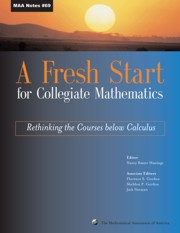Book contents
- Frontmatter
- Preface
- Contents
- Introduction
- Background
- Theme 1 New Visions for Introductory Collegiate Mathematics
- Theme 2 The Transition from High School to College
- Theme 3 The Needs of Other Disciplines
- Theme 4 Student Learning and Research
- Theme 5 Implementation
- Theme 6 Influencing the Mathematics Community
- Ideas and Projects that Work: Part 1
- Ideas and Projects that Work: Part 2
- 35 Mathematics in Action: Empowering Students with Introductory and Intermediate College Mathematics
- 36 Precalculus: Concepts in Context
- 37 Rethinking College Algebra
- 38 From The Bottom Up
- 39 The Functioning in the Real World Project
- 40 The Importance of a Story Line: Functions as Models of Change
- 41 Using a Guided-Inquiry Approach to Enhance Student Learning in Precalculus
- 42 Maricopa Mathematics
- 43 College Algebra/Quantitative Reasoning at the University of Massachusetts, Boston
- 44 Developmental Algebra: The First Mathematics Course for Many College Students
- 45 Workshop Precalculus: Functions, Data, and Models
- 46 Contemporary College Algebra
- 47 Precalculus: A Study of Functions and Their Applications,
- 48 Success and Failures of a Precalculus Reform Project
38 - From The Bottom Up
from Ideas and Projects that Work: Part 2
- Frontmatter
- Preface
- Contents
- Introduction
- Background
- Theme 1 New Visions for Introductory Collegiate Mathematics
- Theme 2 The Transition from High School to College
- Theme 3 The Needs of Other Disciplines
- Theme 4 Student Learning and Research
- Theme 5 Implementation
- Theme 6 Influencing the Mathematics Community
- Ideas and Projects that Work: Part 1
- Ideas and Projects that Work: Part 2
- 35 Mathematics in Action: Empowering Students with Introductory and Intermediate College Mathematics
- 36 Precalculus: Concepts in Context
- 37 Rethinking College Algebra
- 38 From The Bottom Up
- 39 The Functioning in the Real World Project
- 40 The Importance of a Story Line: Functions as Models of Change
- 41 Using a Guided-Inquiry Approach to Enhance Student Learning in Precalculus
- 42 Maricopa Mathematics
- 43 College Algebra/Quantitative Reasoning at the University of Massachusetts, Boston
- 44 Developmental Algebra: The First Mathematics Course for Many College Students
- 45 Workshop Precalculus: Functions, Data, and Models
- 46 Contemporary College Algebra
- 47 Precalculus: A Study of Functions and Their Applications,
- 48 Success and Failures of a Precalculus Reform Project
Summary
In 1989 the National Council of Teachers of Mathematics (NCTM) published a rather remarkable document, known to all now as the NCTM Standards. The Standards recognized and announced that we have done a rather poor job of teaching mathematics at the K–12 level. It set out a rather bold agenda for new curricula and pedagogy built around a number of principles focused upon improving the mathematics education of all students. To a surprising extent this document went relatively unnoticed at the undergraduate level. That state of affairs changed rather dramatically in 1997–8, when new curricula built to embody the Standards' philosophy began appearing in published form.
It is important to note and underscore the fact that the NCTM Standards used the words mathematics education to mean the education of our nation's students in mathematics—not the education of mathematicians. This distinction underlies much of the later criticism, which has become akin to a religious dispute, played out in a variety of political arenas. Needless to say, COMAP embraced the Standards mission as our own.
In fact, we received one of the National Science Foundation grants to produce a comprehensive fouryear secondary school mathematics curriculum, published under the title Mathematics:Modeling Our World (M:MOW). This project took six years to complete and the texts began appearing in 1998.
But we were struck by the fact that much of the material in these books was a significant part of the college algebra and precalculus syllabi.
- Type
- Chapter
- Information
- A Fresh Start for Collegiate MathematicsRethinking the Courses below Calculus, pp. 345 - 347Publisher: Mathematical Association of AmericaPrint publication year: 2006
- 1
- Cited by

